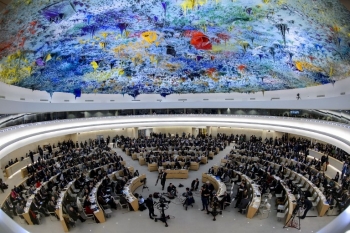On 23 October 2014, Liechtenstein delivered a statement during the interactive dialogue with the Special Rapporteur on the situation on human rights defenders, Michael Forst, expressing concern over reprisals against human rights defenders in Bahrain at the Third Committee meeting of the 69th Session of the United Nations General Assembly. Americans for Democracy & Human Rights in Bahrain (ADHRB), the Bahrain Center for Human Rights (BCHR) and the Bahrain Institute for Rights and Democracy (BIRD) welcome the statement and praise Austria, Croatia, the Czech Republic, Denmark, Iceland, Ireland, Liechtenstein, Montenegro, Norway, Poland, Slovenia and Sweden for supporting it.
“We are grateful to Liechtenstein and the supporting countries for expressing their concern regarding the ongoing reprisals against human rights defenders in Bahrain,” said Husain Abdulla, ADHRB’s Executive Director. “Only through pressure from the international community will the Bahraini government realize that it can no longer target human rights defenders with impunity and end such abuses.”
The statement noted with concern the Government of Bahrain’s renewed campaign against human rights defenders, which stands “in stark contrast to the acceptance by the Government of Bahrain of UPR recommendations made in 2012 regarding the abandoning of any restrictions on human rights defenders.” Supporters of the statement asked the Special Rapporteur to comment on the current engagement between the mandate and the Government of Bahrain, particularly as it pertains to scheduling a visit to the country.
“By accepting 158 recommendations provided through its 2012 Second Cycle UPR, the Government of Bahrain made a commitment to the international community that it would implement reform and end reprisals against human rights defenders. Clearly, this hasn’t happened,” said Sayed Ahmed Alwadaei, Director of Advocacy at BIRD. “We urge the Bahraini government to immediately arrange for Special Rapporteur Forst to visit the country so he may investigate the situation of human rights defenders in Bahrain.”
Supporters of the statement also noted that “several human rights defenders have been arrested or otherwise faced reprisals due to their activities on social media.” In Bahrain, the use of repressive terrorism laws from July 2013 has led to an increase in judicial reprisals against human rights defenders for expressing themselves, particularly via social media.
Nabeel Rajab, President of the Bahrain Centre for Human Rights (BCHR), was arrested on 1 October 2014 and charged with insulting the Ministry of Interior and the Bahrain Defense Forces for a comment he made on his personal Twitter account. The government arrested Rajab the day after he returned from an advocacy tour in Europe, where he spoke about human rights abuses in Bahrain at the United Nations Human Rights Council in Geneva, addressed the European Parliament in Brussels, and visited foreign ministries throughout Europe.
“Not only is the supposed crime for which Rajab has been charged a clear human rights violation, but the timing of his detention indicates that he is being targeted for his human rights work,” said Sayed Yousif Almuhafdah, Vice President of BCHR. “Human rights defenders must be free to conduct their peaceful activism without fearing reprisals from their government.”
/129

